It was the middle of the night when Hakan Kocakara woke from his sleep, in the apartment he shared with his young family.
The lamp next to his bed was moving.
He sat up. The whole room was shaking, the building he lived in was swaying. He knew instantly that he and his family were in danger.
He shouted to his wife and ran to where his children slept, picking them up and cuddling them close, as they made their way to the bathroom.
Hakan knew this must be an earthquake and he had to find the safest place in his home to protect his family.
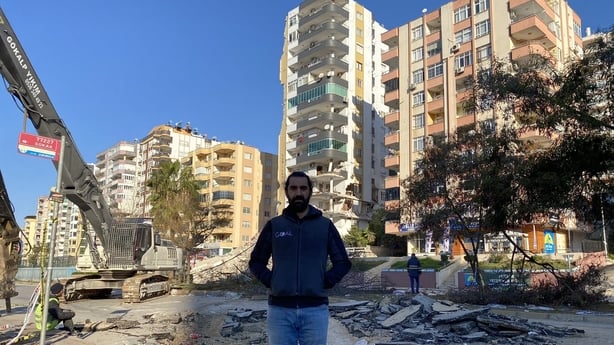
They lay down next to the bathtub, which he thought would be strong enough to withstand any falling concrete.
The whole family huddled together, as the ground beneath them shook furiously.
The ordeal lasted for two minutes, but it felt like hours, as Hakan lay there gripped by fear, holding his children and his wife.
When the shaking stopped, they picked up their children and ran to get out.
Clear of the building, they made their way to a nearby park in the centre of the city of Adana where they would be safe. A woman there gave him a blanket to keep the children warm, and they stood in the cold for hours.
The next morning, Hakan's wife and children drove out of Adana, to be with her relatives in central Turkey, away from the earthquake zone.
Their building didn’t collapse, but their trust in its safety did, and nobody wanted to return for fear it might collapse.
Hakan stayed in Adana, where he could sleep in a caravan on a site owned by his employer, the Irish aid agency GOAL.
It was over for now. He and his family were safe.
But for others the terror was only beginning.
Trapped for hours
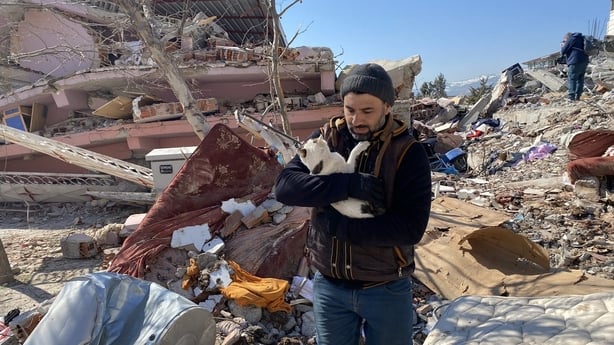
In the town of Nurdağı, close to the epicentre of the earthquake, a Syrian refugee named Ali returns to his collapsed home every day to feed his cat, which refuses to leave.
When the earthquake struck, Ali and seven other members of his family were woken from their sleep by the shaking.
Terrified, they tried to escape, but the roof of the building caved in, and they were trapped.
They remained in total darkness under the rubble for hours, until a neighbour arrived at dawn, and started removing the concrete by hand.
He worked brick-by-brick, tunnelling a small hole into the side of the collapsed building until eventually he could see a set of eyes and a haunted face peering back at him.
Ali was rescued.
Six other members of his family crawled to freedom from beneath the rubble and got out alive.
But his 14-year-old daughter didn’t make it.
She was killed when a supporting wall caved in on top of her.
As he told me about her, Ali placed a hand on his chest and looked up, thanking Allah for sparing so many members of his family.
But here was a father grieving the loss of his little girl, and he sobbed.
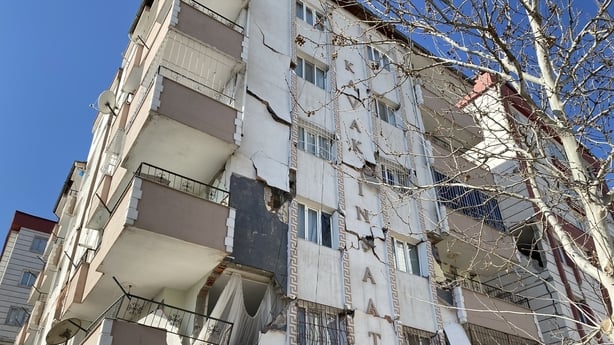
As we talked, machines roared in the background and rescue teams worked tirelessly on a site where 13 people were trapped beneath a collapsed apartment building.
They had sent a text message the day before to say they were alive, and search teams tried frantically to try to get them out.
Just a few yards away, their families stood anxiously watching, and silently praying.
Every half an hour, the search teams would stop, the machines would be shut off, traffic on the nearby road would be halted, and a member of the rescue team would call outt: "Can anybody hear me?"
Then an eerie silence as they waited and listened and hoped.
Minutes later, the dig resumed, a machine moved a giant concrete slab, an internal wall from the collapsed apartment block.
Then the workers stopped again. One of them called for a blanket. Another called for a body bag.
The search team paused, placed their hands on their hearts and looked down, as a body was removed quickly and taken away.
Survivors left in despair
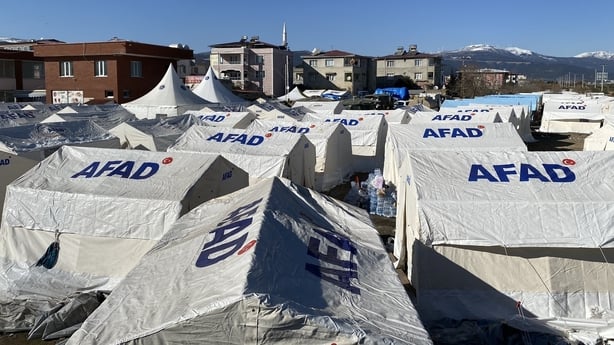
As the days went on there were many more moments like this, many more families left in despair.
For those who survived too, the elation they felt at being spared, soon turned to fear of what would happen to them now.
They were left with no clothes, no food, no homes.
The weather, especially at night, was freezing. They were offered tents from the government agency in charge of the emergency, while volunteers arrived with food.
But there are millions of them, tens of thousands of them are children, young babies, living in the freezing cold, by the side of the road.
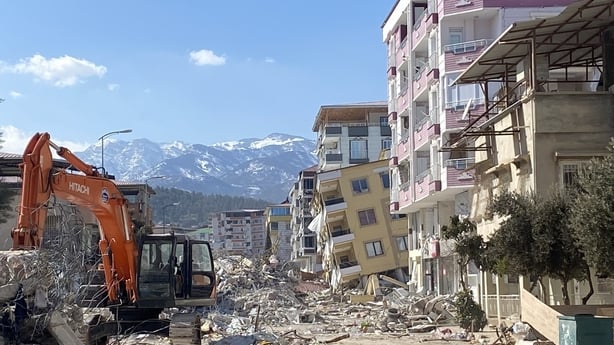
A halo of smoke still hangs over each village, each town and city affected by the earthquake as people light fires to keep themselves warm.
But they face the prospect of living like this for months, maybe even longer.
Across the border in Syria things are even more bleak.
There, the international aid came too late. The diggers and heavy-lifting machines that came to Turkey didn’t make it on time.
The food, the tents, the field hospitals didn’t come, and now they feel abandoned. Betrayed.
Some of the survivors tell us that Turkey and Syria will be scarred forever by what happened.
They live now in a hellish nightmare, left with nothing but fear of what the future holds.







